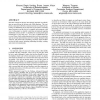Free Online Productivity Tools
i2Speak
i2Symbol
i2OCR
iTex2Img
iWeb2Print
iWeb2Shot
i2Type
iPdf2Split
iPdf2Merge
i2Bopomofo
i2Arabic
i2Style
i2Image
i2PDF
iLatex2Rtf
Sci2ools
118
click to vote
AGENTS
2001
Springer
2001
Springer
Implementing soft real-time agent control
Real-time control has become increasingly important as technologies are moved from the lab into real world situations. The complexity associated with these systems increases as control and autonomy are distributed, due to such issues as precedence constraints, shared resources, and the lack of a complete and consistent world view. In this paper we describe a real-time environment requiring distributed control, and how we modified our existing multi-agent technologies to meet this need. Two types of enhancements are covered: those which enable planning to meet real-time constraints, such as our task representation, meta-level costing, alternative plan selection, and partial-order scheduling, and those which facilitate on-line real-time control, including scheduling flexibility, caching, and windowed commitments.
AGENTS 2001 | On-line Real-time Control | Real World Situations | Real-time Control | Security Privacy |
Related Content
| Added | 28 Jul 2010 |
| Updated | 28 Jul 2010 |
| Type | Conference |
| Year | 2001 |
| Where | AGENTS |
| Authors | Régis Vincent, Bryan Horling, Victor R. Lesser, Thomas Wagner |
Comments (0)

